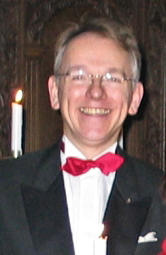CASTRATI: In Search
of a Lost Voice (BK)
This news item was provided by Sue Loder, Production Manager
at BBC Bristol. (Editor)

Nick Clapton
The British Broadcasting Corporation is not without nerve,
when required. On the 5th July 2006 they broadcast a television
programme that features some beautifully-lit and composed
close-up shots…. of castrated testicles. Nestling
artistically in a bowl, they seem to glow softly, with
tiny blood vessels tracing their pebble-like surfaces
like spider tracks. Of course, this is all in the service
of educating, informing and indeed entertaining their
audience who have tuned in to see the latest in BBC4’s
season about the “18th Century, the Century that
Made Us” - a documentary produced by Francesca Kemp
entitled simply “Castrati”. One hopes and
assumes that the objects in question were acquired at
some nearby butchers shop.
For those who might be unsure, the castrati were the singing
marvels of their time - for about a hundred years they
dominated the operatic stages of Europe with their amazing
voices, and even more amazing salaries. Perhaps perversely,
some were also reputed to have active sex lives, of a
sort. But what, besides the exoticism, should attract
a viewer to such a programme? The presenter is Nicholas
Clapton, a countertenor and author of works on these legendary
divos. “Well, it is true that most people are above
all fascinated by "the operation", but I would
also say that castrati are a wonderful typification of
everything "exotic and irrational" (to quote
Dr Johnson) in 18th-century Italian opera, and once introduced
to their repertoire, many music lovers are delighted by
the beauty of the repertoire which, except for Handel,
is still largely unknown, and the amazing technical ability
that these singers had.”
Anyone who has studied, or even just listened intently,
to the great works of Handel, Vivaldi, Scarlatti, Hasse
or a dozen other baroque composers, will be very well
aware of the technical demands of the music, and how intensely
trained and talented these singers must have been. However,
what we do not, indeed cannot, know is exactly how they
sounded, despite the odd, sadly incomplete, remnant of
recorded voice still available. And that is the other
thrust of this programme - a scientific and thoughtful
attempt to re-create the lost sound of the castrati. There
is good visual and endocrinological evidence to support
the idea that the castrato sound was basically that of
an unbroken voice in a frequently oversized adult male
body. Yet whether this task is something that should be
attempted can be left to the viewer to decide; the process
is certainly fascinating to watch. One of the highlights
on the musical side is undoubtedly a far-too-short appearance
by the young American male soprano Michael Maniaci, whose
extraordinarily beautiful and rare voice is, in this reviewer’s
opinion, a far more acceptable modern-day substitute than
any audiologically-correct but electronically-generated
sound so far achieved by the scientists. In a way, I rather
hope they never do succeed. Let the lost voice remain
lost - and forever marvellous in our collective musical
memory.
The broadcast is scheduled for screening on BBC 4 television
on July 5th at 2100hrs.
Sue Loder
Editor's note: Two weeks after this broadcast,
the Exeter
Summer Festival programme includes Welsh mezzo-soprano
Buddug Verona James' one-woman show Castradiva which
celebrates the lives and music of Roman castrato singers
around 1700. Details are here.

